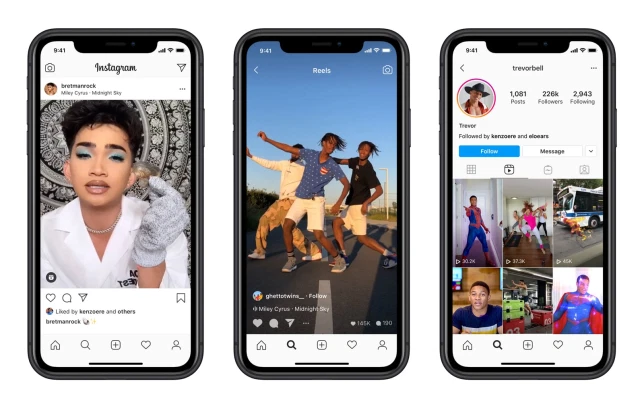Facebook has launched ads on Instagram Reels, its answer to TikTok, as the social network looks to offer brands more ways to reach its users.
Launched last year, Instagram Reels lets creators to upload short-form videos which are then presented to viewers via an algorithmically-driven feed based on tailored preferences.
Instagram initially tested ads against Reels in India, Brazil, Germany and Australia in April with brands such as BMW, Louis Vuitton, Netflix and Uber.
Ads on Reels will loop and can be up to 30 seconds, and will be shown between individual videos.
Instagram’s Chief Operating Officer Justin Osofsky, said: “We see Reels as a great way for people to discover new content on Instagram, and so ads are a natural fit. Brands of all sizes can take advantage of this new creative format in an environment where people are already being entertained.”
TikTok has deployed ads, but they are less common than those seen on a regular Instagram feed. While on Instagram, a user can expect to see one ad for every handful of posts they scroll past on their feed, TikTok adverts are far less frequent.
Mary Keane-Dawson, CEO of global influencer marketing agency TAKUMI, commented on the move.
“The global expansion of ads in Instagram Reels is the latest sign of the Facebook-owned app’s commitment to becoming a one-stop-shop for any marketers’ needs”, said Keane-Dawson. “ In its early days, Instagram sought to strike a balance between developing with consumers and marketers in mind. But – more recently – it’s clear the focus is on the latter, with the reformatting of the home screen to promote the app’s shopping function being a case in point. With this latest update, Instagram will not only increase and improve opportunities for marketers to generate sales, but it will also enhance their ability to measure ROI more accurately on social media and influencer marketing campaigns – a longstanding industry concern.
“It’s easy to see why Instagram has opted to make this update now. The social media cold war the app is engaged in with TikTok has seen both platforms rapidly expand their e-commerce capabilities which, in turn, has led to more brands than ever using social media and influencers for marketing. Our whitepaper, Into the mainstream: Influencer marketing in society, which surveyed 3,500 consumers, marketers across the UK, US and Germany, found that almost three quarters of marketers have allocated more resources to influencer marketing in the past year.
“With more brands across a range of sectors opting to market via influencers, we can expect Instagram to continue to look for opportunities to monetise their site in their pursuit to become the hub for commerce on social media.”

